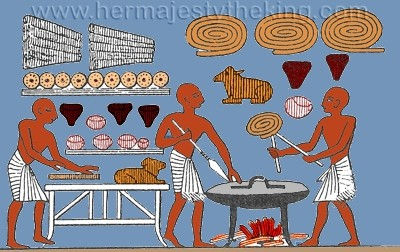I knew they were coming so I baked a cake
- Sep 13, 2017
- 4 min read
"cakes are the edible milestones in our lives." Jill Dupleix

It's my turn to host the local book group tonight, so I baked a cake. Not a very elaborate cake as you can see - I'm not very good at it and I'm a bit worried that this particular one is soggy in the middle and burnt on the outside. Anyway it got me to thinking about how long ago cake began. I mean it's not a necessary food is it?
It seems that generally speaking the opinion seems to be that it was the ancient Egyptians who first made cakes. (Though I'm not convinced that this particular picture is genuine.)

Mind you it also seems that archaeologists have found simple cakes made from crushed grains, moistened, compacted and probably cooked on a hot stone, that date back to the Neolithic period. I think that is way beyond the Egyptians, but then it also doesn't sound much like cake other than the shape. More like bread surely?
Now I can absolutely imagine that bread goes back to the very earliest times, but cake? Why would they cook cake? It's a luxury item that takes time and effort, specialised equipment and skill - none of which would have been in big supply in Neolithic times. I reckon there are two or three reasons and none of them would necessarily have existed in primitive nomadic type people.
The first is to appease the gods. Most of those ancient civilisations seem to have spent a lot of time trying to appease the gods, who were, of course, responsible for the weather and the availability of food. Give the gods presents (even your own people it seems - whether in the form of a sacrifice or as a dedication to the gods - the ancient equivalent of monks and nuns), and the gods will smile down on you. And I suppose that people had already developed a sweet tooth - mostly for fruit and honey, and somebody was clever enough to combine the fruit, nuts and honey into something that you could glue together and cook. Way back then they did not have raising agents though, so the cakes would not have been light and airy sponges. Maybe they had cheesecakes though. It took effort to make a cake, so this would be another reason why the gods would be pleased. The Egyptians are credited with using yeast as a raising agent, and so they might have made some bread like fruit cakes. The guy in the picture on the right is shaping dough into spirals that are then deep fried - and maybe drizzled with honey. Simple but effective I guess.
A similar reason would be to mark the passing of time - as Jill Dupleix says we still do - and she is right. A birthday is not a birthday without a cake. Back then it would mostly not be a personal marking of time, but more of an acknowledgement of the seasons. All those pagan festivals of the past had particular foods associated with them and some of them were cakes - like the yuletide log - and they continue to this day. Then there were the ceremonial occasions - birth, death, marriage, new kings, treaties ... all of them celebrated with feasts which included something sweet to finish them off. Mind you, having said that the celebrations would be unlikely to be personal, it seems that Ovid, the Roman poet, describes cakes he enjoyed at his birthdays from a young age.
But you would have to have a complex society, in which some of the members had the time and the money to do this. It's almost a sign of decadence I think. Hard working peasants don't have the means to make these things. But then again, they did like to celebrate when they could and cakes would have been a great treat.
I tried to find some pictures that dated way back, of cakes, but honestly could not find any.
Cakes are mostly round - did you ever ponder on why? Well it seems that it's associated with the circularity of life - the seasons, and also the sun and the moon. Of course we now have myriads of other shapes, but the basic cake tin is still round. Maybe there is a practical reason too - maybe they cook better if they are that shape. I'm afraid I'm not enough of a scientist to contemplate that.
"Next time you enjoy your cake, think of all the human inventions needed over time, necessary to allow you this little luxury."
Very true. Raising agents - I don't think baking powder was invented until the 19th or was it 18th century, so earlier cakes would have been a bit dense. Then there are ovens - Delia maintains that if your cake is cooked on one side and not the other, for example, it's the fault of the oven, not you. So think what an oven from back when they first had ovens would have done to your cake. It would have taken some skill to bake a cake. And indeed most people used the local baker's ovens for anything that needed to cook in an oven. Yet look at the popularity of wood-fired pizza ovens and Agas! And these days, like me today, we can use electric mixers to do all the tedious beating and whisking, and we have all sorts of clever pans in which to cook them.
These days far too much cake is consumed. We can buy ready-made cakes, cake mixes, and every possible ingredient. Cafés serving coffee and cake all day are everywhere, and we are all growing fat because of it. But really we can't resist can we? A group of friends is meeting tonight to discuss a book and to enjoy each other's company. What better way to reinforce the friendship than with a cake.

"A cake is a symbol of love and friendship - if someone actually goes to the trouble of baking a cake specially for family and friends, they can't fail to feel spoiled and cared for." Delia Smith
"We no longer stop for a civilised and leisurely afternoon tea, but a cake still takes the cake for those times when we like to reward ourselves for doing something absolutely brilliant, or to make us feel better after doing something absolutely dreadful." Jill Dupleix












Comments